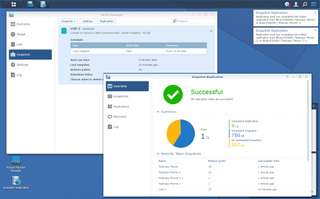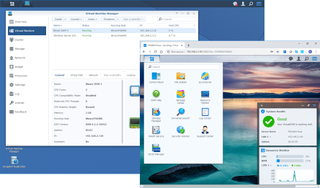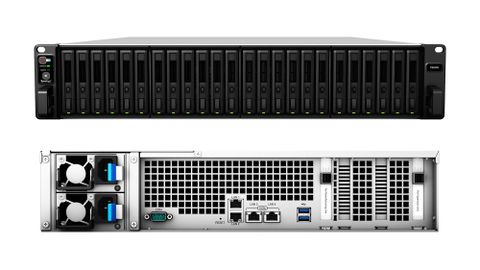IT Pro Verdict
There’s limited hardware redundancy on display, but the FS6400 offers a powerful all-Flash package with a wealth of storage features and great performance
Pros
- +
Xeon Scalable CPUs; Big memory capacity; Feature-packed DSM software; Supports SAS3 and SATA SSDs; Great performance
Cons
- -
No integral controller failover; Single expansion port
SMBs looking for the best storage performance will find all-Flash arrays (AFAs) a great choice, although most mid-range and enterprise level solutions are way beyond their budgets. Synology's FlashStation appliances are designed to offer SMBs a more affordable and versatile NAS/IP SAN solution, with the FS6400 delivering an impressive hardware package for less than 10K.
The FS6400 replaces the FS3017 which was launched early in 2017 and it's endowed with a vastly superior specification. You have a pair of 2.1GHz Intel Xeon Scalable Silver 4110 CPUs in the driving seat and partnered by 32GB of DDR4 ECC memory expandable to 512GB.
The FlashStations are all about choice as they support cheap, high-capacity SATA SSDs, expensive, high-performance SAS3 SSDs and spinning disks as well. With 24 SFF hot-swap bays available, the FS6400 allows SMEs to use a mix of technologies so they can balance performance with their budget and save more cash by using their own choice of storage devices.
Two Synology SAS12G HBAs handle all drive bays and the FS6400 supports two 12-bay RX1217sas or 24-bay RX2417sas external disk shelves - although with only one available expansion port, you can't daisy-chain them over redundant links. Two spare PCIe slots are also available, allowing the dual embedded 10GBase-T ports to be augmented with 10GbE, 25GbE and 40GbE adapters.
Synology FlashStation FS6400 review: RAID F1
Synology's discovery web portal found the appliance on the lab network and downloaded the latest DSM 6.2 OS - winner of this year's 'best software' award from our sister publication PC Pro. We fitted four enterprise-class 1.92TB Micron 5200 Max SATA SSDs and DSM automatically created a RAID F1 array from them.
RAID F1 was developed by Synology to stop SSDs all wearing at equal rates, thereby avoiding the potential for multiple, simultaneous SSD failures. When an F1 array is created, the DSM software automatically nominates one SSD for sacrifice.

It writes more parity blocks to this SSD ensuring it'll reach the end of its lifespan before the other array members. You can keep a close eye on its estimated lifespan from the DSM Storage and Snapshots app and when it is replaced, the array takes the next oldest for this role during the rebuild.
Synology FlashStation FS6400 review: SATA SSD performance
We started our performance tests with iSCSI and called up the lab's Dell PowerEdge T640 Xeon Scalable tower server running Windows Server 2019. Once logged in to a 500GB block-based target over a dedicated 10GbE connection, Iometer reported sequential read and write speeds of 9.2Gbits/sec and 9.1Gbits/sec.
With a dual 10GbE MPIO connection in action, we saw speeds ramp up nicely to 18.5Gbits/sec and 12.6Gbits/sec. Dropping the Iometer block size to 4KB returned good throughput with the MPIO link delivering sequential read and write rates of 185,200 IOPS and 167,000 IOPS, dropping slightly to 181,300 IOPS and 155,500 IOPS for random operations.
NAS performance is up there too, as a mapped share returned Iometer sequential read and write speeds of 9.2Gbits/sec and 9.1Gbits/sec. NAS I/O throughput is another winner; here, the share delivered 162,000 IOPS and 129,500 IOPS for sequential reads and writes while random reads and writes settled at 158,000 IOPS and 92,000 IOPS.
We ramped up the pressure by mapping another share on the same Micron-based array to a second Xeon Scalable Windows server over a dedicated 10GbE link. With Iometer running on both servers, we recorded cumulative sequential read and write speeds of 18.5Gbits/sec and 17.2Gbits/sec plus random read and write throughputs of 296,500 IOPS and 171,500 IOPS.
Synology FlashStation FS6400 review: Data protection features
Value gets a boost too, and Synology's DSM 6.2 software offers a superb range of storage and data protection features all included in the price. Whereas many competing AFAs require license upgrades for feature enhancements and to increase the number of snapshots supported, DSM allows you to create up to 1,024 per NAS share and a total of 65,536 per system.

Support for BTRFS volumes brings NAS share and iSCSI LUN snapshots into play. Managed by the Snapshot Replication app, we created snapshots on demand and scheduled them at regular intervals as often as every five minutes.
LUN snapshots can also be managed directly from the iSCSI Manager app and data recovery is a cinch - simply choose a snapshot, clone it or copy it in place. NAS snapshot restoration is run from the Snapshot Replication app and if you opt to browse their contents, it loads the File Station app where you can download a file or email it as an attachment.
Synology FlashStation FS6400 review: Virtualization
Virtualization features are in abundance as DSM is certified for use with VMware's vSphere and VAAI software, so the appliance's advanced iSCSI LUNs support features such as hardware assisted locking, full copy, full clone and thin provisioning. And then there's DSM's very own Virtual Machine Manager (VMM) app which allows the appliance to host VMs running pretty much any OS you fancy.
The VMM dashboard provides quick access to VMs and the vSwitch service can be used to isolate them on specific network ports. Even better, VMM offers protection plans for scheduled backups of selected VMs using snapshots, as well as facilities for applying retention policies to achieve a desired RPO (recovery point objective) in hours, days or weeks.
The VMM app has another trick up its virtual sleeve as you can use it to run other instances of DSM. You get one free license included as standard, allowing you to create a virtual appliance and present a specific set of storage services.
Synology FlashStation FS6400 review: Verdict
With its single expansion port and lack of dual controllers, the FS6400 doesn't offer the same levels of redundancy as many competing AFAs but it beats them handsomely for value. It offers a powerful Xeon Scalable package for the price, Synology's DSM software delivers a wealth of storage features as standard and overall performance using low-cost SATA SSDs is impressive.
| Chassis | 2U rack |
| CPU | 2 x 8-core 2.1GHz Intel Xeon Scalable Silver 4110 |
| Memory | 32GB DDR4 ECC RDIMM (max 512GB) |
| Storage | 24 x SAS3/SATA SFF hot-swap bays, |
| RAID | Synology DSM |
| Array support | RAID F1, 0, 1, 10, 5, 6, global hot-spare, JBOD |
| Expansion | 2 x PCIe Gen3 |
| Network | 2 x Gigabit, 2 x 10GBase-T |
| Other ports | 2 x USB 3, SAS3 expansion port |
| Power | 2 x 800W hot-plug PSUs |
| Management | Web browser |
| Warranty | 5 years limited |
Dave is an IT consultant and freelance journalist specialising in hands-on reviews of computer networking products covering all market sectors from small businesses to enterprises. Founder of Binary Testing Ltd – the UK’s premier independent network testing laboratory - Dave has over 45 years of experience in the IT industry.
Dave has produced many thousands of in-depth business networking product reviews from his lab which have been reproduced globally. Writing for ITPro and its sister title, PC Pro, he covers all areas of business IT infrastructure, including servers, storage, network security, data protection, cloud, infrastructure and services.



